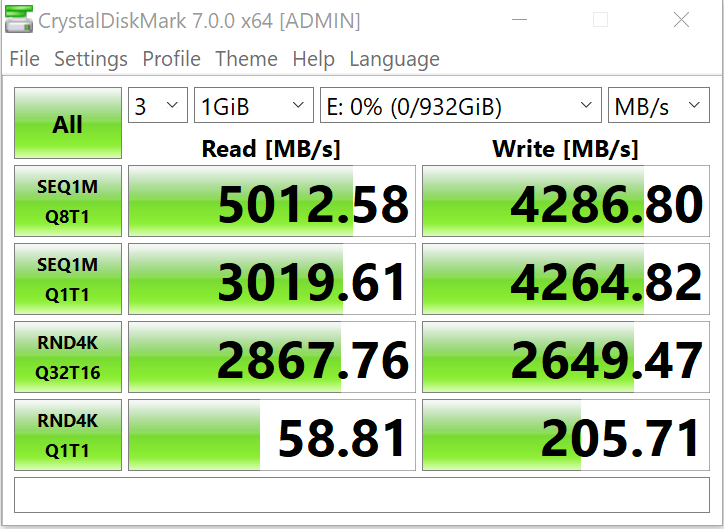CRYSTAL DISK BENCHMARK VER. 0.0 X64
Crystal Disk Benchmark is used to measure read and write performance through sampling of random data which is, for the most part, incompressible. Performance is virtually identical, regardless of data sample so we have included only that using random data samples.
THROUGHPUT
PEAK
Very strong performance is shown in both the throughput and IOPS results of the newest version of Crystal Diskmark 7. Gotta love those random 4K IOPS above 700k,
The toughest benchmark available for solid state drives is AS SSD as it relies solely on incompressible data samples when testing performance. For the most part, AS SSD tests can be considered the ‘worst case scenario’ in obtaining data transfer speeds and many enthusiasts like AS SSD for their needs. Transfer speeds are displayed on the left with IOPS results on the right.The AS SSD results aren’t as appealing as we might like to see but do get a first look at read and write IOPS which appear to be in the general ball park of listed specs.
AS SSD is a bit lower in throughput as expected but the IOPS on the chart to the left is strong.
ANVIL STORAGE UTILITIES PROFESSIONAL
Anvil’s Storage Utilities (ASU) are the most complete test bed available for the solid state drive today. The benchmark displays test results for, not only throughput but also, IOPS and Disk Access Times. Not only does it have a preset SSD benchmark, but also, it has included such things as endurance testing and threaded I/O read, write and mixed tests, all of which are very simple to understand and use in our benchmark testing.
The AJA Video Systems Disk Test is relatively new to our testing and tests the transfer speed of video files with different resolutions and Codec.
TxBench is one of our newly discovered benchmarks that we works much the same as Crystal Diskmark, but with several other features. Advanced load benchmarking can be configured, as well as full drive information and data erasing via secure erase, enhanced secure erase, TRIM and overwriting. Simply click on the title for a free copy.
The SSD Review uses PCMark 8’s Storage test suite to create testing scenarios that might be used in the typical user experience. With 10 traces recorded from Adobe Creative Suite, Microsoft Office and a selection of popular games, it covers some of the most popular light to heavy workloads. Unlike synthetic storage tests, the PCMark 8 Storage benchmark highlights real-world performance differences between storage devices. After an initial break-in cycle and three rounds of the testing, we are given a file score and bandwidth amount. The higher the score/bandwidth, the better the drive performs.
Much lower than expected and we are going to call it a compatibility issue, which happens with different benchmark programs from time to time. We should be seeing number similar to the Seagate 520 at 667MB/s or the Corsair MP600 at 707MB/s. We reran this test several times with the same result.
 The SSD Review The Worlds Dedicated SSD Education and Review Resource |
The SSD Review The Worlds Dedicated SSD Education and Review Resource | 


You made jump for the XP941 years ago, as well as an avid ASRock Rack user, now you get me buying the Sabrent.
I bought their external cloning drive caddy for HDD & SSD, with USB 3 ports 7 years ago, 26 bucks. Works like a champ with Acronis too.
Great review, thanks.
If you have been around since the XP941 days, my thanks sincerely. Some great memories throughout the years and the fiasco that resulted in Samsung severely limiting the XP941 availability solely the result of our report brings back some memories. Have a good one and enjoy.
Just a quick question. Is there a timeframe for the release of the Phison E18 controller? It would be good for us consumers to have an option for drives that could test the 7GB read max throughput of the PCI 4 controller. Thanks.
No word as of yet. The difficulty is going to lie in the heat produced by the faster speeds. IMO, passive heatsinks simply won’t suffice at some point. I have to wonder if there will be a line in the sand, at least with M.2 form factors.
Heat shouldn’t be too bad, they are dropping down from the 28nm process to 12nm. That alone should help a lot with managing power consumption. and ultimately heat. Just look at the leap in efficiency AMD got over Intel. Next-gen products just may make Gen4 SSDs a viable upgrade.
Update… Just spoke with Chris at Phison who says they were hoping around Computex which would be next month or so. It would then be a bit later as manufacturers got it up for sale.
Computex has been delayed until September 2020. So I would expect wider availability only in 2021.
The 4TB version is only 5x the price of the 1TB version, and available now.
I too would prefer to max out the PCIe 4.0 and have a newer controller (and NVMe version), fortunately I won’t be buying until next year.
The 4TB version is only a Gen 3×4. It won’t reach this performance. Stay tuned for our report within the next week or so… and then maybe the 8TB after that.